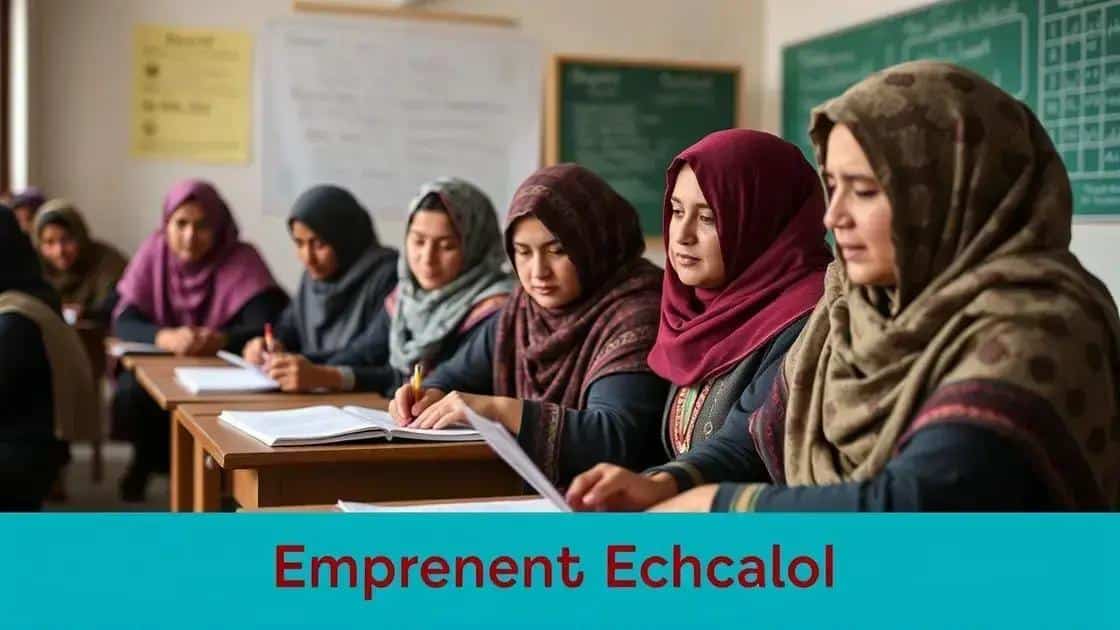Trump cuts educational funding for Afghan women studying abroad

Trump cuts to educational funding for Afghan women studying abroad threaten their opportunities for empowerment and growth, risking a significant setback for women’s rights and education in Afghanistan.
Trump cuts educational funding for Afghan women studying abroad has created a significant ripple effect. How will this decision shape their future and the global perspective on education equity?
The impact of funding cuts on Afghan women
The impact of funding cuts on Afghan women has been devastating. These cuts reduce opportunities for education and personal growth, leading to a cycle of poverty and inequality. Many young women, who had hopes of studying abroad, now face uncertainty about their future.
Education at Risk
With decreasing funds, schools and universities are less able to support their female students. This lack of resources limits access to essential educational tools, making it difficult for women to pursue their dreams. The absence of funding is not just a temporary setback; it could hinder an entire generation.
Strategies for Resilience
Despite these challenges, Afghan women are showing remarkable resilience. Many are finding alternative solutions to continue their education.
- Utilizing online courses and resources
- Creating study groups to share knowledge
- Seeking support from NGOs and international organizations
- Advocating for their rights and education
These efforts highlight the strength and determination of women facing adversity.
Furthermore, the impact of these funding cuts extends beyond education. It affects health services, job training programs, and community support systems crucial for women’s development. The effects ripple through families and communities, affecting everyone.
Community Support
Community initiatives have emerged to help Afghan women in this difficult time. Local organizations are teaming up to provide mentoring and support networks.
- Mentorship programs connecting experienced women with students
- Workshops focusing on skills training
- Colleges offering scholarships tailored for women
Such initiatives reinforce the message that education is vital and empowering for Afghan women.
In a world where every voice matters, the plight of Afghan women needs greater attention. As the funding cuts continue to affect educational programs, it’s crucial to support these women in their fight for a brighter future. Together, we can elevate their voices and help create opportunities that will ensure their success.
Educational opportunities for women in Afghanistan

Educational opportunities for women in Afghanistan have undergone significant changes in recent years. While there have been strides in increasing access, challenges remain that threaten these advancements. Understanding the landscape of education for women is crucial in supporting their futures.
Current Landscape of Education
The current state of education is a mix of hope and fear. Many women are eager to learn, but barriers stand in their way. Schools often lack resources, and cultural attitudes can limit access. Yet, the determination of Afghan women drives them to seek knowledge despite these hardships.
Programs Supporting Women’s Education
Several programs are working tirelessly to enhance educational opportunities for women.
- Scholarships designated for female students
- Community-based education initiatives
- International organizations providing resources
- Online learning platforms offering diverse courses
These programs not only provide education but also foster leadership skills among young women.
Technology is also playing a pivotal role. Access to online courses allows women to learn at their own pace and pursue subjects that interest them. This flexibility is empowering for many aspiring students. However, internet access can still be a challenge in certain areas, hindering progress.
Breaking Down Societal Barriers
To expand educational opportunities, it’s essential to address societal views on women’s education. Advocacy plays a key role in changing perceptions. Local leaders and activists are standing up for women’s rights, emphasizing the importance of education for success.
- Public campaigns raising awareness
- Community workshops on the value of education
- Partnerships with local governments
These initiatives help shift the narrative and open doors for young women seeking education. A supportive community can greatly influence a woman’s ability to pursue her dreams.
The commitment to improving educational opportunities is vital for the future of Afghanistan. By continuing to advocate for women’s rights and investing in their education, the nation can pave the way for a brighter, more equitable future.
International response to the funding cuts
The international response to the funding cuts for Afghan women has been both swift and significant. Many countries and organizations are voicing concerns about the impact of these cuts on women’s education and rights. These reactions highlight the global understanding of the importance of education for women.
Global Outcry and Advocacy
International organizations such as the United Nations have condemned the funding cuts. They emphasize that education is a fundamental human right that should be accessible to all, especially for women. Numerous advocacy groups are rallying support to pressure governments to reconsider these decisions.
Support Initiatives
Various countries have initiated programs aimed at supporting Afghan women. These initiatives often focus on providing educational resources and financial aid to sustain students.
- Scholarship programs specifically for Afghan female students
- Emergency funding for schools in Afghanistan
- Partnerships with local NGOs to deliver essential services
- Digital learning opportunities to ensure continuity of education
Such efforts aim to fill the gaps left by funding cuts and promote the empowerment of Afghan women.
Many nations are also offering refuge to Afghan women scholars and students. By providing asylum, they encourage these women to pursue their education in safer environments. This approach not only aids individual women but also fosters a culture of support and solidarity.
Influence on Policy Changes
The backlash against the funding cuts is influencing policy discussions in various international forums. Countries are beginning to recognize the long-term benefits of investing in women’s education, understanding that it leads to healthier communities and stronger economies.
- Influencing aid policies to prioritize women
- Encouraging countries to adopt educational reforms
- Promoting gender equality in aid distribution
This shift could pave the way for future funding strategies that prioritize education for women in conflict areas.
The emphasis on education as a tool for empowerment remains strong. As the international community unites to support Afghan women, there is hope of reversing the negative impacts of funding cuts and ensuring sustainable access to education.
Future implications for Afghan women’s education

The future implications for Afghan women’s education are influenced by current events and decisions made today. If funding cuts continue, the dream of education for many young women may fade. It’s essential to understand how these changes could shape their lives and the nation’s future.
Potential Outcomes of Reduced Funding
If the cuts remain in place, we may see a decline in the number of women pursuing higher education. Fewer opportunities could lead to increased poverty rates among households that rely on women’s education for economic stability. The loss of educated women means a setback for women’s rights and development in the country.
Increasing Global Awareness
As international attention focuses on Afghanistan, there’s hope for changing circumstances. Advocacy and support from global organizations can help increase educational opportunities.
- Policy changes that prioritize female education
- Increased funding from international donors
- Programs that promote STEM fields among women
These initiatives can significantly impact the landscape of education for women, promoting a future where they can thrive.
Technology may also play a crucial role moving forward. With the rise of online learning, Afghan women could access educational resources remotely. This opening could help women continue their studies despite local constraints. However, challenges with internet access and infrastructure must be addressed to make this a reality.
Role of Local Communities
Local communities will be vital in shaping the future of women’s education in Afghanistan. Grassroots movements can advocate for educational rights and provide support systems for women.
- Establishing local mentorship programs
- Creating safe spaces for learning
- Promoting awareness of educational benefits
A strong community can empower women to pursue education and demand their rights, fostering a culture of learning and growth.
The outlook for Afghan women’s education will largely depend on collective efforts. By supporting women and advocating for their rights, we can work towards a future where every Afghan girl has the opportunity to learn and succeed.
In conclusion, the future of Afghan women’s education is at a critical juncture. With ongoing funding cuts and societal challenges, it’s more important than ever to advocate for change. The collective effort of international supporters, local communities, and educational programs can help create a brighter future for women in Afghanistan. By investing in their education, we pave the way for a stronger, more equitable society. Together, we can ensure that every Afghan girl has the opportunity to learn and succeed.
FAQ – Frequently Asked Questions about Afghan Women’s Education
What are the main challenges facing Afghan women’s education?
The main challenges include funding cuts, cultural barriers, and limited resources in schools.
How can international organizations support Afghan women’s education?
International organizations can provide funding, scholarships, and resources to help women pursue their education.
What role does technology play in women’s education in Afghanistan?
Technology offers access to online learning, allowing women to study remotely and continue their education despite local restrictions.
How can local communities help improve educational opportunities for women?
Local communities can establish mentorship programs, advocate for women’s rights, and create safe spaces for learning.






